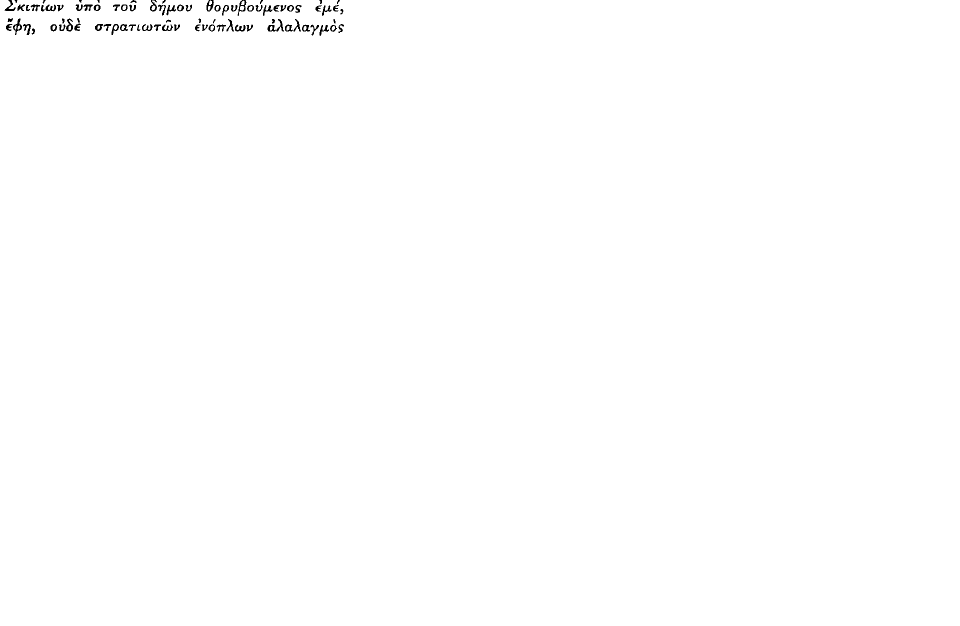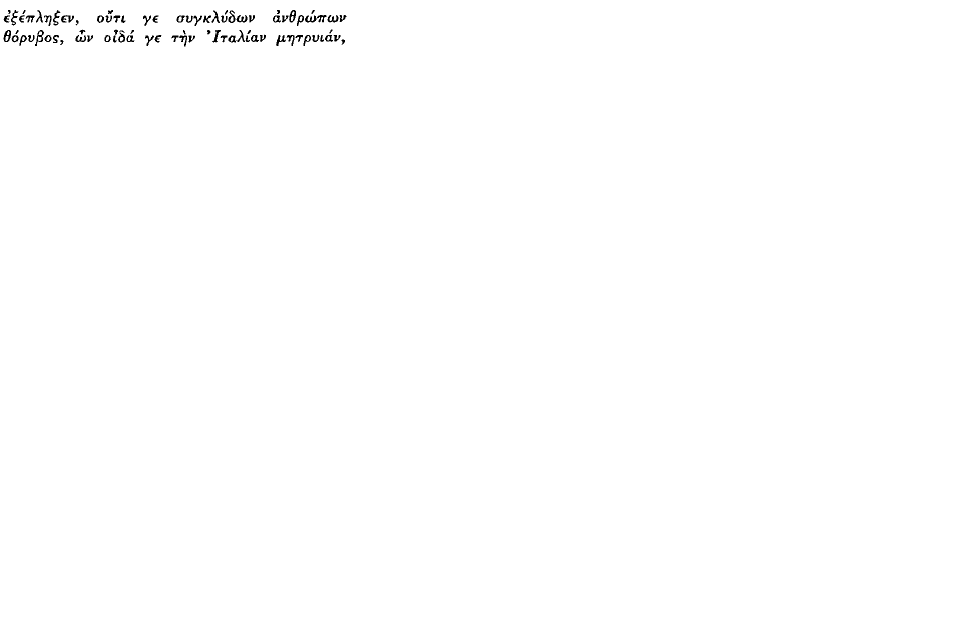Article contents
Dicta Scipionis of 131 B.C. 1
Published online by Cambridge University Press: 11 February 2009
Extract
For the historian who aspires to the study of Scipio Aemilianus one of the happier features of his material is the considerable number of Scipio's dicta which have been preserved: sayings which are distinct from the extracts from formal speeches yet which in most cases were uttered in public. This paper is concerned with a small group of such dicta which belong to the last period of Scipio's life, between his return from Numantia in 132 and his death in 129. The intention is not to provide an historical interpretation (which must be reserved for an extended discussion of Scipio's career) but simply to establish die content, context, and relationship of the sayings concerned. At the request of the editors I do not quote in full the passages which provide the evidence, most of which are reproduced, at least in part, on pages 131 f. of the second edition of Malcovati's Oratorum Romanorum Fragmenta.
- Type
- Research Article
- Information
- Copyright
- Copyright © The Classical Association 1960
References
page 135 note 2 In due course I hope to publish a complete collection of the dicta. A number of them are discussed by Fraccaro in his section on Scipio in ‘Oratori ed orazioni dell'età dei Gracchi’ in Studi Storici, v (1912), 362 ff. In this paper I express disagreement with Fraccaro's interpretation of certain points but I would not wish this to obscure my great respect for his valuable work.Google Scholar
page 135 note 3 The passages not quoted in O.R.F. 2 are Grillius, , Comm. in De Invent. Cic., p. 598. 31 (Halm), Polyaenus, Strat. 8. 16. 5, and an important part of Plut. Ti. Grac. 21.5. All these are given in full at the appropriate points in this paper.Google Scholar
page 135 note 4 Cic. De Orat. 2. 106;Google Scholar Veil. 2. 4. 4; Val. Max. 6. 2. 3; Livy, , Epit. 59;Google Scholar (Victor) De Vir. Ill. 58. 8; Grillius, , Comm. in De Invent. Cic. p. 598. 31 (Halm). The last (not in O.R.F. 2) reads: ‘Et Scipio, tantus vir, qui productus a tribuno pi. eos [both the Gracchi!] dixit iure caesos videri, favore nobilitatis hoc fecit.’Google Scholar
page 135 note 5 Fraccaro, , op. cit., p. 440 n. 2,Google Scholar maintains that Carbo's tribunate is to be dated 130, not 131, while Broughton, , M.R.R. i. 502 ff.Google Scholar, does not commit himself; but the arguments of Münzer, , R.E. xviii. 3. 1017f.Google Scholar, seem decisive for 131 (which is accepted also by Badian, , Foreign Clientelae, p. 175 n. 2Google Scholar). I have used the conventional simplification of identifying the tribunician year widi the calendar year to which it very largely corresponded, but for the possibility that the incident under discussion occurred at the very end of 132 see below, p. 139 and n. 2.
page 135 note 6 Livy, , Epit. 59;Google ScholarCic. De Amic. 96.Google Scholar
page 135 note 7 Münzer, , R.E. iv. 1. 1457;Google ScholarFraccaro, , op. cit., p. 388.Google Scholar
page 135 note 8 Op. cit., p. 393.Google Scholar
page 136 note 1 Münzer, , R.E. iv. i. 1457;Google ScholarMeyer, , Untersuchungen zur Geschichte der Gracchen, p. 2611.Google Scholar 2 (= Kleins Schriften, i. 408 n. 2Google Scholar); Carcopino, , Autour des Gracques, p. 86;Google ScholarLincke, , P. Cornelius Scipio Aemilianus, p. 30 n. 28.Google ScholarBilz, , Die Politik des P. Cornelius Scipio Aemilianus, p. 73 n. 199, probably accepts the qualification but is not absolutely clear.Google Scholar
page 136 note 2 Op. cit., pp. 389 ff.Google Scholar
page 136 note 3 Plut. Ti. Grac. 21. 4 

page 136 note 4 It is sufficient for the present purpose to note that Laelius and P. Rupilius both participated in the persecution of the Grac-chans in 132 : Cic. De Amic. 37;Google Scholar Vell. 2. 7. 4; Val. Max. 4. 7. 1. Scipio Nasica Serapio, who incited and led the attack on Tiberius, may be another who had political links with Aemilianus independent of the Gracchan crisis, but his position is not completely straightforward and needs some discussion.
page 137 note 1 Badian, , op. cit., p. 175 n. 2, argues that there is no need to think the addition an invention as it serves no tendentious purpose. This is not decisive, since it could con ceivably have been the tendentious fiction of a pro-Gracchan writer anxious to make out that Scipio's judgement was not clear and definite, to minimize the hostility of the great man. Nevertheless Badian's argument carries weight to the extent that omission, tendentious or careless, seems much more probable than tendentious fiction.Google Scholar
page 137 note 2 Val. Max. 6. 2. 3; De Vir. Ill. 58. 8; Plut. Apophth. Scip. Min. 22 (Mor. 201 e); Polyaen. Strat. 8. 16. 5 (not in O.R.F. 2) 

 The wording of Polyaenus is very similar to that of Plutarch, though lacking the latter's introductory clauses. Whether the longer version noverca, non mater est (De Vir. Ill.; Plut.; Polyaen.) is original or a later expansion (as is quite possible) is of little general significance and of none at all for the present discussion.
The wording of Polyaenus is very similar to that of Plutarch, though lacking the latter's introductory clauses. Whether the longer version noverca, non mater est (De Vir. Ill.; Plut.; Polyaen.) is original or a later expansion (as is quite possible) is of little general significance and of none at all for the present discussion.
page 137 note 3 Val. Max.: Non efficietis ait ut solutos verear quos adligatos adduxi. De Vir. Ill.: Et addidit, Quos ego sub corona vendidi.
page 137 note 4 Doubtless Carbo and his associates had a group of followers ready to lead and en courage such a reaction. Indeed Mrs. Atkinson suggests to me that Scipio may have intended to direct the noverca saying at just such a claque of freedmen. This is possible but even if this was Scipio's intention it is clear that the remark was interpreted as being directed at the whole crowd.
page 138 note 1 Op. cit., pp. 390 ff.Google Scholar The same conclusion is implicit in the remarks of Carcopino, , op. cit., pp. 84 ff.,Google Scholar and in the opinion of Badian, op. cit., p. 175, that Scipio's caution in his reply to Carbo enabled him to secure the rejection of Carbo's bill (an hypothesis with which, as will be seen, I disagree). Bilz, , op. cit., p. 73 n. 200, evidently favours 131,Google Scholar as does Lincke, , op. cit., p. 30, but both, like Fraccaro, think that Plutarch associates the dictum with a separate dispute in 129—concerning which see below.Google Scholar
page 138 note 2 Its relevance to Tiberius' attempt to secure re-election is of course recognized by Fraccaro, , op. cit., p. 393 n. 1.Google Scholar
page 138 note 3 Cic. Phil. 11. 18.Google Scholar
page 138 note 4 During his tribunate Carbo successfully promoted a bill to substitute the ballot for oral voting in legislative comitia, a measure which certainly made it harder to control the votes of clients (Cic. De Leg. 3. 35Google Scholar). There is no indication as to whether this preceded or followed the rejection of his bill concerning the tribunate, but the latter is obviously probable and the ballot law may well be a direct reaction to the defeat of the other.
page 139 note 1 Ti. Grac. 21. 4–5.Google Scholar
page 139 note 2 As is well known, tribunes entered office on 10 December. If Carbo tabled his bill almost at once—and it surely represents a prepared attack, planned to vindicate the Gracchan cause—contiones might have been held before the end of the year. A fairly early date would tie in with Scipio's ig nominious failure to secure the command against Aristonicus.
page 139 note 3 Plutarch, , Apophth. Scip. Min. 23,Google Scholar has preserved one further dictum from the post-Numantine period of Scipio's life: his proud reply to the cry of ‘Kill the tyrant’ raised by Gaius Gracchus and his followers. Fraccaro, , op. cit., p. 391, holds that the incident occurred in 129. Although his arguments fall short of proof and it is conceivable that it occurred earlier, e.g. in 131, nevertheless it is quite possible that 129 is right. In any case there is no positive evidence to link the dictum with the group discussed in this paper.Google Scholar
- 1
- Cited by




